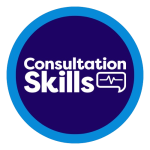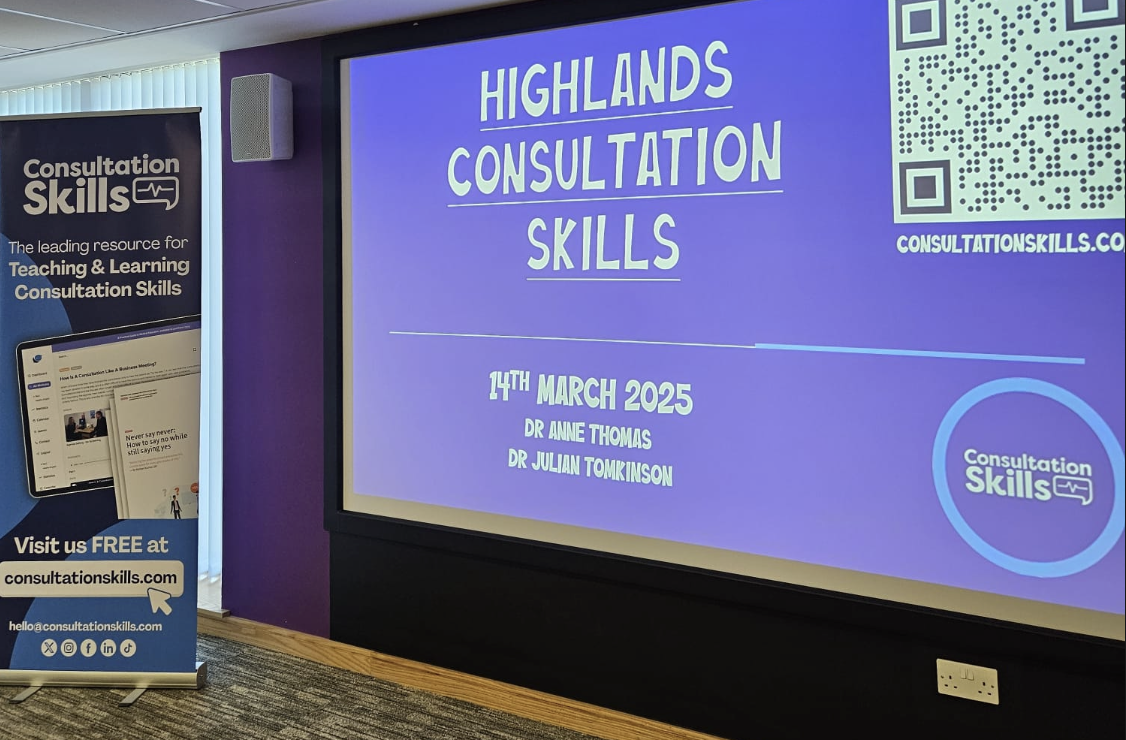On Friday, 14th March 2025, we delivered a full-day Consultation Skills Training session for healthcare professionals in NHS Highland. Led by Dr Julian Tomkinson and Dr Anne Thomas, the event took place at the Auditorium, UHI House, Inverness, with a packed programme designed to enhance consultation effectiveness, improve patient relationships, and support clinician well-being.
A special thanks to Fiona Ward, Clinical Lead for First Contact Physiotherapists in General Practice, NHS North Highland, and Jude Arnaud, Clinical Lead for First Contact Physiotherapists in General Practice, NHS North Highland, for their invaluable support in making this event possible.
Training Content & Themes
The training covered key consultation skills essential for building rapport, managing time effectively, and understanding patient needs. The sessions included:
- How better consultation skills help both clinicians and patients – Exploring the direct impact of effective communication on patient outcomes and clinician satisfaction.
- ‘Why are you here?’ – Understanding patient agendas – Techniques for uncovering patients’ true concerns to ensure effective consultations.
- How to go home with energy to spare – Practical approaches to avoiding burnout and maintaining resilience.
- Managing patient expectations – Strategies for setting realistic expectations while maintaining strong therapeutic relationships.
- The many skills of listening – Practical exercises exploring active listening, avoiding interruptions, and eliciting patient stories more effectively.
- Strategies for managing difficult conversations – How to navigate patient conflicts, maintain rapport, and set boundaries without causing tension.
Challenges & Solutions
Many participants highlighted common challenges, including time pressures, patient expectations, and emotional fatigue. Through interactive discussions and practical exercises, attendees learned how structured consultation techniques, such as active listening, agenda setting, and managing difficult conversations, can alleviate these pressures and improve patient care.
Key strategies explored included:
- Using open-ended prompts to encourage deeper dialogue.
- Avoiding immediate ‘no’ responses and instead exploring patient perspectives with curiosity.
- Managing energy levels to maintain effectiveness throughout the day.
- Utilising structured consultation models to streamline discussions and avoid unnecessary stress.
Outcomes & Impact
The training received highly positive feedback, with participants reporting:
- Increased confidence in handling complex patient interactions.
- Greater awareness of how to structure consultations for efficiency and effectiveness.
- Improved ability to manage patient expectations and avoid conflict.
- Practical takeaways that could be immediately implemented in daily practice.
Feedback Highlights
From open-text poll responses, attendees noted key learning points:
- “That listening and addressing people’s expectations (rather than meeting them) results in satisfaction.”
- “Shut up and listen. Be curious. Find common ground.”
- “How changing key words can change what people tell you.”
- “Managing conflict – thinking yes first, before navigating to a solution.”
- “Using key questions to structure consultations and guide conversations.”
A rating poll showed 94% of attendees rated the session 5 out of 5.
Testimonials
Here’s what some of our attendees had to say about the training:
- “Fantastic event! It was great to have the Consultation Skills team running this session with us. We had a diverse range of healthcare professionals from the multidisciplinary team in general practice, and it was really valuable to talk about our consultation and communication skills.”
- “The listening exercises were eye-opening. I realised how much more I can learn just by allowing patients to talk without interruption.”
- “The session reminded me of the importance of simply shutting up and listening. An essential skill in general practice.”
- “This training reinforced that we don’t have to rigidly follow consultation structures we learned at university. Instead, we can adapt, flex, and let patients do more of the talking, which makes a huge difference.”
- “By reflecting on our consultation styles and adjusting them, we can achieve better patient outcomes and avoid feeling completely drained by the end of the day.”
- “It takes less energy, benefits the patient, and improves overall efficiency and satisfaction for both clinician and patient.”
Next Steps
For those who attended, follow-up resources and additional training opportunities are available at www.consultationskills.com. If your organisation is interested in bespoke consultation skills training, contact us today

